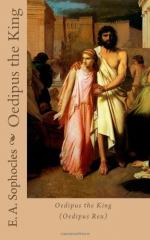|
This section contains 416 words (approx. 2 pages at 300 words per page) |

|
Fateful Decisions in Oedipus
Summary: Discusses the ancient Greek play, King Oedipus by Sophocles. Examines the tragic elements of the play. Describes how Oedipus' decisions led to his downfall.
In Oedipus Rex by Sophocles, the question arises as to whether Oedipus has freedom of choice in his actions. According to Aristotle's poetics, a tragedy must consist of the tragic flaw in the character coupled with the role of destiny.
Oedipus' character contains the element of hamartia or the tragic flaw. Hamartia is the excessive defect in a character's behaviour that will contribute to his downfall. The tragic flaw should be the only reason why the tragedy ends in a catastrophe. Without this flaw, all negative actions preformed by the character could have been avoided.
The Change of fortune should not be from misfortune to prosperity but, on the contrary, from prosperity to misfortune. This change should not be caused by outright wickedness but by a serious flaw in a character.
(32)
Oedipus' tragic flaw is his hubris or excessive pride. Some might say that without this tragic flaw...
|
This section contains 416 words (approx. 2 pages at 300 words per page) |

|


